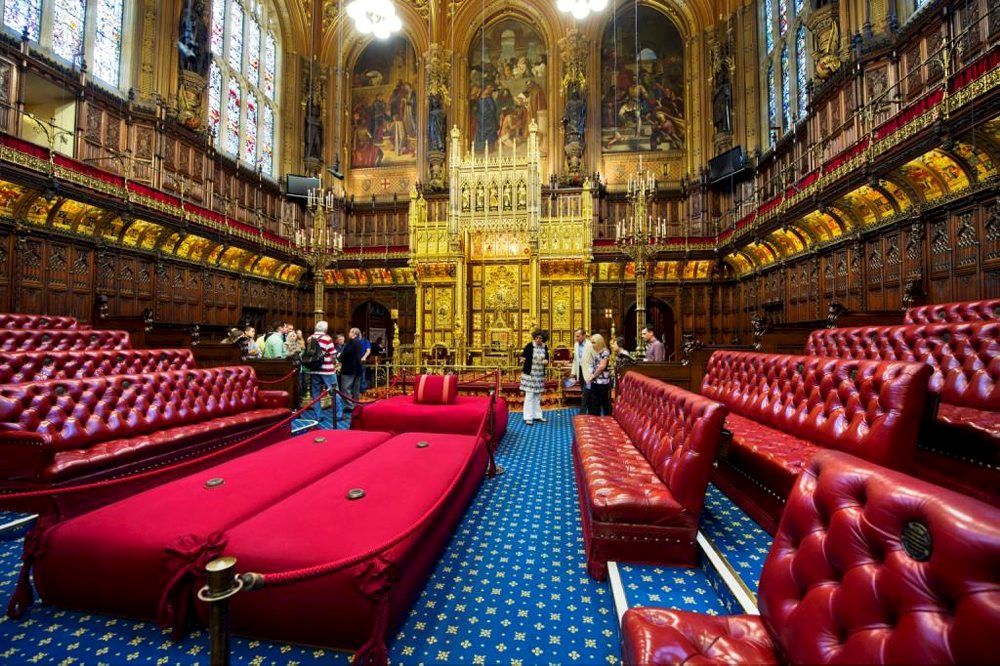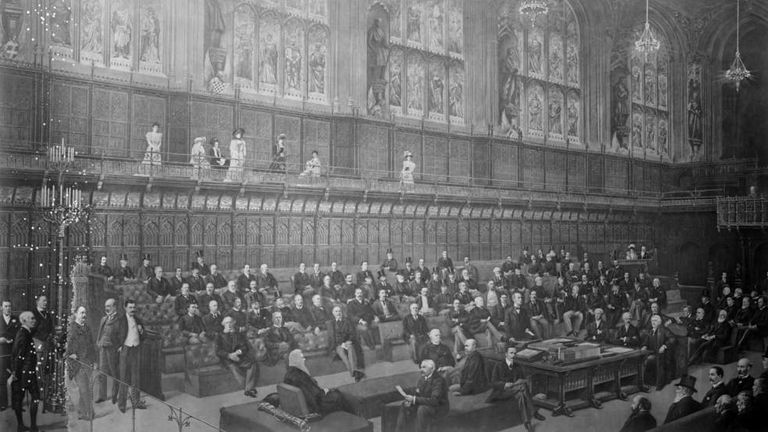House of Lords British Parliament, History & Powers

When Parliament passed the “Test Act,” which prevented Catholics from holding elected office, the legislature was at odds with King James II, himself a Catholic. After years of political in-fighting during the Glorious Revolution, Parliament deposed James II in 1689 and his eldest daughter Mary and her husband William of Orange ascended to the throne. There are also peers who remain members of the House, but are currently ineligible to sit and vote.

Lords reform
The 1911 Act saw this power reduced to the delaying power the Lords has today— this was one of the most radical reforms to the House of Lords in its history. Since 1999, there have been several unsuccessful attempts to reform the House of Lords, mostly due to disagreements over what should replace it. When in government, the party established a royal commission chaired by Lord Wakenham recommending a mostly appointed, partly elected chamber. The average age of all eligible members of the Lords is 71, and over two thirds of this number are male (71 %).
Lords debates failings of the transport system - Committees
Lords debates failings of the transport system.
Posted: Fri, 26 Apr 2024 16:52:40 GMT [source]
Resigned under the Constitutional Reform and Governance Act 2010
A similar provision was enacted when Ireland merged with Great Britain in 1801 to form the United Kingdom; the Irish peers were allowed to elect 28 Irish representative peers, who were to retain office for life. Elections for Irish representatives ended in 1922, when most of Ireland became an independent state known as the Irish Free State; elections for Scottish representatives ended with the passage of the Peerage Act 1963, under which all Scottish peers obtained seats in the Upper House. Since the Dissolution of the Monasteries, the Lords Temporal have been the most numerous group in the House of Lords.
History
By convention, however, the Prime Minister allows leaders of other parties to nominate some life peers, so as to maintain a political balance in the House of Lords. Moreover, some non-party life peers (the number being determined by the Prime Minister) are nominated by the independent House of Lords Appointments Commission. In 1999, the Labour government brought forward the House of Lords Act removing the right of several hundred hereditary peers to sit in the House. The Act provided, as a measure intended to be temporary, that 92 people would continue to sit in the Lords by virtue of hereditary peerages, and this is still in effect. Archbishops and bishops of the Church of Scotland historically sat in the Parliament of Scotland but were finally excluded in 1689 (after a number of previous exclusions) when the Church of Scotland became permanently Presbyterian. There are no longer archbishops and bishops in the Church of Scotland in the traditional sense of the word, and that Church has never sent members to sit in the Westminster House of Lords.
Rwanda bill to become law after late night row between government and Lords - Sky News
Rwanda bill to become law after late night row between government and Lords.
Posted: Tue, 23 Apr 2024 07:09:52 GMT [source]
The judicial functions could also be exercised by Lords of Appeal (other members of the House who happened to have held high judicial office). No Lord of Appeal in Ordinary or Lord of Appeal could sit judicially beyond the age of seventy-five. The judicial business of the Lords was supervised by the Senior Lord of Appeal in Ordinary and their deputy, the Second Senior Lord of Appeal in Ordinary.
Legislative functions
As of August 2023, the Conservatives are the largest party group with 270 eligible peers, along with 180 crossbench peers, 175 Labour peers, 84 Liberal Democrat peers, 25 bishops and 50 other peers (including peers from other parties, non-affiliated peers, and the Lord Speaker). The House of Lords oversees more general scrutiny work by questioning ministers, conducting inquiries and engaging in debates. There are various Lords select committees in that investigate specialised topics and publish reports, which can contribute to more informed policy decisions. Once all speeches on a motion have concluded, or Closure invoked, the motion may be put to a vote. The House first votes by voice vote; the Lord Speaker or Deputy Speaker puts the question, and the Lords respond either "content" (in favour of the motion) or "not content" (against the motion). The presiding officer then announces the result of the voice vote, but if his assessment is challenged by any Lord, a recorded vote known as a division follows.
The House would be presided over not by the Lord Chancellor, but by the Lord High Steward, an official especially appointed for the occasion of the trial. If Parliament was not in session, then peers could be tried in a separate court, known as the Lord High Steward's Court. Only peers, their wives, and their widows (unless remarried) were entitled to such trials; the Lords Spiritual were tried in ecclesiastical courts.
Although the defeat of government legislation by the house has been relatively rare on major legislation, it sometimes does defy the government, especially Labour Party governments. For example, 230 pieces of legislation proposed by the Labour government of 1974–79 were defeated by the House of Lords. The abolition of the office was rejected by the House of Lords, and the Constitutional Reform Act 2005 was thus amended to preserve the office of Lord Chancellor.
The first English Parliament is often considered to be either Simon de Montfort's Parliament (held in 1265) or the "Model Parliament" (held in 1295), which included archbishops, bishops, abbots, earls, barons, and representatives of the shires and boroughs. Other things being equal, most parliaments are better with second chambers than without them. But its undemocratic composition deprives it of the legitimacy to impede rather than merely advise the government of the day. Keir Starmer has even promised to abolish and replace the House of Lords, but then so have most of his predecessors, with no specific plan. It delivers appalling value for huge sums of public money, and is a mere sop to rightwing voters. That request was made in order to meet the pledge Rishi Sunak made to “stop the boats”, despite polling showing that support for the Rwanda bill was low.
Though Appellate Committees met in separate committee rooms, judgement was given in the Lords Chamber itself. By a custom that prevailed even before the Parliament Acts, the House of Lords is further restrained insofar as financial bills are concerned. The House of Lords may neither originate a bill concerning taxation or Supply (supply of treasury or exchequer funds), nor amend a bill so as to insert a taxation or Supply-related provision. (The House of Commons, however, often waives its privileges and allows the Upper House to make amendments with financial implications.) Moreover, the Upper House may not amend any Supply Bill. The House of Lords formerly maintained the absolute power to reject a bill relating to revenue or Supply, but this power was curtailed by the Parliament Acts.
Since 1 October 2009 this role is now held by the Supreme Court of the United Kingdom. The House of Lords does not control the term of the prime minister or of the government.[20] Only the lower house may force the prime minister to resign or call elections by passing a motion of no-confidence or by withdrawing supply. However, the power of the Lords to reject a bill passed by the House of Commons is severely restricted by the Parliament Acts. Under those Acts, certain types of bills may be presented for Royal Assent without the consent of the House of Lords (i.e. the Commons can override the Lords' veto). The House of Lords cannot delay a money bill (a bill that, in the view of the Speaker of the House of Commons, solely concerns national taxation or public funds) for more than one month.
Parliament is the legislative body of the United Kingdom and is the primary law-making institution in Great Britain’s constitutional monarchy. The history of the legislative body—which meets in the Palace of Westminster in London—shows how it evolved almost organically, partly in response to the needs of the country’s reigning monarch. Parliament traces its roots back to the earliest meetings of English barons and commoners in the 8th century. During question time and debates in the chamber members put questions to government ministers who must respond. Up to the passing of the Parliament Act 1911, the House of Lords held the power to veto bills passed by the Commons.
The crisis damaged the political influence of the House of Lords but did not altogether end it. Lords Temporal include life peers, excepted hereditary peers elected under the House of Lords Act 1999 and remaining law life peers. The vast majority are life peers who have been appointed for life, either as political appointees nominated by party leaders, or as crossbench peers unaffiliated to a party who are appointed for their expertise. Many have or have had successful careers in business, culture, sports, academia, law, health, public service or politics. Typically, these are sessional committees, meaning that their members are appointed by the House at the beginning of each session, and continue to serve until the next parliamentary session begins. In practice, these are often permanent committees, which are re-established during every session.
Comments
Post a Comment